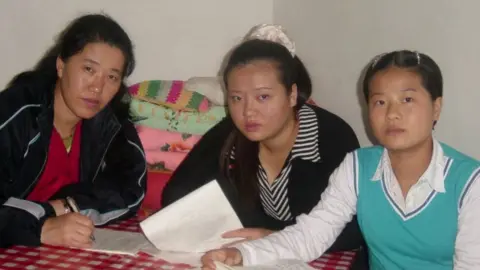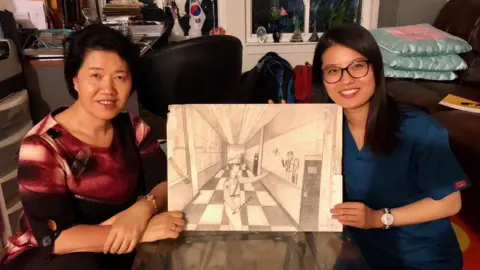Trump Kim summit: Missed chance to discuss human rights, says defector
 Grace Jo
Grace JoIn the late 1990s, Grace Jo was still a child in rural North Korea when her dark black hair turned yellow. "I was so malnourished," she said, "we would spend days without having anything to eat". One of her two brothers, the youngest, had already died of starvation; the other, weak, could barely walk.
Her eldest sister had left the family in search of food and had never come back. Her father had also died, Ms Jo said, after being arrested and then tortured as he returned from China where he had gone to buy rice.
The only hope for those still alive to survive, her mother thought, was to escape.
From their north-eastern province of North Hamgyong, Ms Jo, then aged seven, her mother and another sister, Jinhye, 10, walked for three days on unpaved roads and through mountains, until they reached the Tumen River and crossed into China.
Once there, they lived underground, fearful of being caught - China, North Korea's main ally, has a strict policy of sending defectors back. During that time, they learned that Ms Jo's five-year-old brother, who had been unable to travel and so stayed behind, had also died.
"We tried many ways to stay in China," she said. But in 2001, three years after arriving, they were found out, jailed and returned.
Back in North Korea, Ms Jo's mother was sent to a forced labour camp while the girls were put in an orphanage, where they also had to work. Eight months later, as the two children were being transferred to a different shelter, they managed to escape. Their mother had already been released and, shortly after, the three were back together.
In 2002, they managed to flee North Korea for a second time. Ms Jo's mother bribed some border guards but, two years later, they were caught again and sent back. "We thought we would die in prison. We didn't have any hope."
But, while in China, they had started working with an American-Korean pastor to protect North Korean defectors. Now, it was them who needed help. So in 2006, he paid some $10,000 (£7,500) in bribes to the North's secret police to free the family. "Money talks in North Korea," Ms Jo said, and four months later they were released.
For a third time, they escaped to China and, in 2008, the United Nations High Commission for Refugees (UNHCR) settled them as refugees in the United States.
Ten years later, Ms Jo, who is now a college student in Maryland, would watch something she thought impossible unfold: the leaders of the US and North Korea shaking hands.
Just months before, Donald Trump and Kim Jong-un had been exchanging insults and threats of war. Now, both were holding unprecedented talks in Singapore.
Watching as the two leaders sat alongside each other, Grace Jo felt doubtful that ordinary North Koreans, struggling under tight sanctions imposed on the country over its nuclear and weapons tests, would see any benefits.
"It's a strategy" said Ms Jo, who is now one of the leaders of North Korean Refugees in the United States (NKinUSA), an organisation founded by her sister to help other defectors.
"If he [Mr Kim] wants to get money, he needs to get rid of the sanctions. Then money will come into North Korea and he will keep his regime alive."
Many analysts already see the summit as a victory for Mr Kim, who runs a totalitarian regime with extreme censorship and forced labour camps. North Koreans can be jailed for almost anything, activists say, and there are between 80,000 and 120,000 people in prisons across the country, according to a report by the US State Department.
The economy is also strictly controlled and the government funnels money into its missile and nuclear programme - the focus of the talks - despite widespread shortages of basic necessities.
"I feel very sorry that human rights are not being discussed," said Ms Jo. "We can't separate the nuclear issue from human rights issues. They developed nuclear arms while people were dying of starvation, others in prisons."
 Grace Jo
Grace JoAt the time when Ms Jo made her first escape, North Korea was facing a severe famine, which killed hundreds of thousands, possibly millions, of people. When she was five, she said, she was so hungry that she ate six newborn mice that her mother boiled after finding them under some stones next to the family's house.
The situation in the isolated country has improved since then, but the North continues to face significant shortages of food, and an estimated 41% of the total population of 25 million are undernourished, according to the UN.
Meanwhile the country's elite enjoy relatively comfortable lives in the capital, Pyongyang.
"I hope this [meeting] will bring change," said Ms Jo, "open North Korea to the world and allow people to have a free life."
